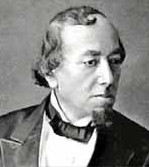| |
The Thunder ChildScience Fiction and Fantasy |
| |
|
|
Fiction Book Reviews by Caroline Miniscule
Caroline Miniscule has traveled around the world. She now stays in one place and reads science fiction. She is a graduate of D'Illyria University.
On November 7, 1861, the US San Jacinto stopped the British mail packet Trent and, in violation of neutrality laws, removed the Confederate ambassadors to England and France, Mason and Slidell. This action outraged the British, who demanded an apology. President Lincoln, intent on fighting only one war at a time, provided that apology. The British, however, decided that they needed to put the upstart Americans in their place ? and declared war. That is the premise of Robert Conroy?s novel, 1862.
Conroy?s novel begins promisingly with the opening scene in England between Palmerston, Russell and Gladstone and their reasons for going to war?but it soon bogs down as it switches between vignettes of too many characters (and not the right characters, in this reviewer?s opinion). Ostensibly the hero is Nathan Hunter, a retired Army Captain mourning not only his wife, dead these five years, but who is also haunted by the memory of the deaths of the soldiers under his command in an Apache attack several years ago. He comes to Washington DC at the behest of retired General Winfield Scott, who wants to use him as a messenger, in order to express his ideas on the conduct of the war to President Lincoln. Also in Washington DC is Rebecca Devon, a young woman recently widowed. Her husband ? a war profiteer ? was killed at Bull Run. Now independently wealthy, she moves through Washington society, and in particular with her friend, Valerie D?Estaing, wife of the French ambassador. Valerie is quite a woman of the world, as Rebecca will find out to her chagrin before the D?Estaing?s are finally banished from the country and from the book. Other stories briefly told belong to ?Hannibal? Watson, a slave who kills his owners and flees towards the North, ?Attila? Flynn, an Irishman who wants his country free from England, and Billy Harwell, a young Union soldier who becomes an expert sharpshooter and a ruthless killer. Lincoln, Stanton and Seward have brief roles to play, as do Winfield Scott. General McClellan?s flaws are laid bare ? as witnessed by Nathan Hunter, who also sees the rise of General U.S. Grant - who replaces McClellan immediately after McClellan's disgrace.
For the Civil War enthusiast who knows every name and every inch of battlefield ground, I suspect this book will be even more disappointing. Conroy makes things as easy as possible for the North ? well, he has only one book in which to tell his tale so can?t have the war extend too long ? and clearly did not do his homework. For one thing, he has the Trent affair begin on November 7, 1861?while in the real world it began on November 8. (Although perhaps he changes the date just so that it can be a springboard for this alternate history tale.) The British and Canadians started preparing for war as soon as they heard of the affair?and these plans have been accessible since 1961, when they appeared in The English Historical Review (Vol 76, No 301). For true verisimilitude Conroy should have incorporated at least some of this into his novel, but he does not. (For example, Rear Admiral Alexander Milne was to have been in charge of the naval force, whereas Conroy uses Sir William Parker.) Conroy?s text is serviceable, but he lacks the knack of drawing the reader into the story such that they feel they?re experiencing it, not reading it. There are a few well-written passages, but not nearly enough. There are no maps, no appendices explaining which characters were real and which weren't, etc., so that's a disappointment too. In short?a good novel exploring ?what if England declared war on the United States during the Civil War? still needs to be written. Return to:
|
All text © 2006 The Thunder Child unless otherwise credited.
All illustrations retain original copyright.
Please contact us with any concerns as to correct attribution.
Any questions, comments or concerns contact The Thunder Child.







